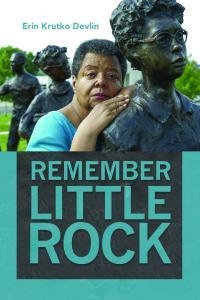 This week we look at a story that calls into question just how successful the Civil Rights Movement really was. It’s the iconic story of the Little Rock Nine, the courageous African American students who began the process of desegregating Central High School in Little Rock, Arkansas. They faced a hostile state governor, Orville Faubus, who called out the state’s National Guard to prevent the federally-mandated desegregation order. Then, after the Eisenhower administration sent in troops from the 101st Airborne to take control of the situation and enforce the order, the students were confronted by raging mobs calling out racial slurs and threatening violence. And all of this was captured on camera. We’ve all seen the images. But there’s a lot more to the story of Little Rock in 1957 and that’s our focus today.
This week we look at a story that calls into question just how successful the Civil Rights Movement really was. It’s the iconic story of the Little Rock Nine, the courageous African American students who began the process of desegregating Central High School in Little Rock, Arkansas. They faced a hostile state governor, Orville Faubus, who called out the state’s National Guard to prevent the federally-mandated desegregation order. Then, after the Eisenhower administration sent in troops from the 101st Airborne to take control of the situation and enforce the order, the students were confronted by raging mobs calling out racial slurs and threatening violence. And all of this was captured on camera. We’ve all seen the images. But there’s a lot more to the story of Little Rock in 1957 and that’s our focus today.
This topic is important because racial segregation in the nation’s public schools is still a huge problem – and it’s getting worse. And the problem isn’t just segregation, because data shows that segregated schools offer fewer college prep courses, and fewer courses and programs in the arts, compared to white majority schools. Segregated schools also have lower graduation rates and higher rates of suspensions and expulsions for discipline problems. In other words, students in these schools in 2017 are being offered an education that is, separate and unequal.
How is this possible? How did we get here?
 Well, part of the reason is that many Americans – remembering uplifting moments like the Little Rock Nine desegregating Central High School 60 years ago this month – believe the problem of segregation in public schools was solved decades ago. It’s in the past. It turns out, that happy memory of a Civil Rights victory in 1957 is actually one of the things that stands in the way of our confronting and resolving the scourge of segregation.
Well, part of the reason is that many Americans – remembering uplifting moments like the Little Rock Nine desegregating Central High School 60 years ago this month – believe the problem of segregation in public schools was solved decades ago. It’s in the past. It turns out, that happy memory of a Civil Rights victory in 1957 is actually one of the things that stands in the way of our confronting and resolving the scourge of segregation.
To help us understand the long and complicated history of Little Rock and desegregation efforts, I speak with historian Erin Krutko Devlin, author of the new book, Remember Little Rock (Univ. of Massachusetts Press, 2017).
Among the many things discussed in this episode:
How the Little Rock crisis of 1957 is part of a problematic triumphant narrative of racial progress.
Why celebrating iconic civil rights victories can bolster a misperception that racism is a thing of the past.
Why 60 years after Little Rock, many public schools in the US remain segregated and unequal.
How opponents of integration in Little Rock and elsewhere turned from Massive Resistance to Passive Resistance to stymie desegregation efforts.
How public officials in Little Rock, Arkansas successfully conspired to thwart meaningful school integration after 1957.
How conservative judges after 1980 began to roll back desegregation programs imposed by lower courts.
What Little Rock in 1957 can tell us about Charlottesville in 2017.
Little Rock and the emergence of Civil Rights tourism.
How Little Rock and the National Park Service site and museum commemorate the #PublicHistory of the Civil Rights movement.
About Erin Krutko Devlin – website
Further Reading
Erin Krutko Devlin, Remember Little Rock (University of Massachusetts Press, 2017)
Karen Anderson, Little Rock: Race and Resistance at Central High School (2010)
Derrick Bell, Silent Covenants: Brown v. Board of Education and the Unfulfilled Hopes for Racial Reform (2004)
Elizabeth Huckaby, Crisis at Central High, Little Rock, 1957-58 (1980)
Jonathan Kozol, Savage Inequalities: Children in America’s Schools (2012)
Jonathan Kozol, The Shame of the Nation: The Restoration of Apartheid Schooling in America (2005).
Carlotta Walls Lanier, A Mighty Long Way: My Journey to Justice at Little Rock Central High School (2010).
Greg Toppo, “GAO study: Segregation worsening in U.S. schools,” USA Today, May 17, 2016
Music for This Episode
Jay Graham, ITPL Intro (JayGMusic.com)
Kevin McCleod, “Impact Moderato” (Free Music Archive)
Jason Shaw, “Acoustic Meditation”
Hefferman, “Winter’s Trek” (Free Music Archive)
The Bell, “I Am History” (Free Music Archive)
Production Credits
Executive Producer: Lulu Spencer
Technical Advisors: Holly Hunt and Jesse Anderson
Podcasting Consultant: Darrell Darnell of Pro Podcast Solutions
Photographer: John Buckingham
Graphic Designer: Maggie Cellucci
Website by: ERI Design
Legal services: Tippecanoe and Tyler Too
Social Media management: The Pony Express
Risk Assessment: Little Big Horn Associates
Growth strategies: 54 40 or Fight
© Snoring Beagle International, 2017
